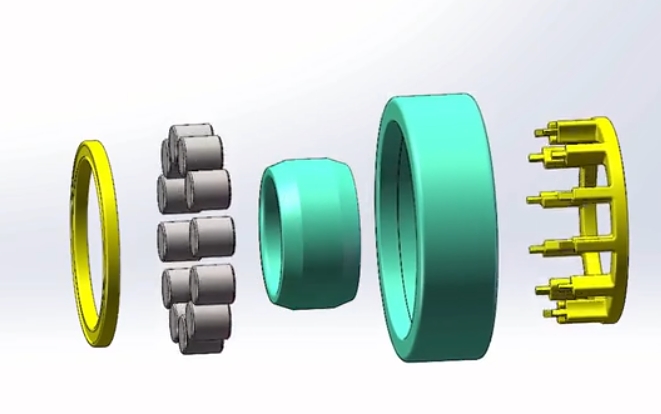
Definition
Cylindrical roller bearings are precision rolling-element bearings designed to carry high radial loads with low friction. They consist of:
- Cylindrical rollers guided by a cage
- Separable inner and outer rings
- Optional ribs for axial guidance
Types and Applications
| Type | Design Code | Typical Applications |
|---|---|---|
| Single row | N/NU/NJ/NF/NUP/NFP/NR/RNU | Gearboxes, electric motors, pumps, machine tool spindles |
| Double row | NN/NNU | Heavy machinery, rolling mills, large gear reducers |
| Multi row | NN30/NNU49 series | Rolling mill stands, extreme radial load situations |
| Full complement (Single-row) | NCF/NJG | Vibrating screens, construction equipment |
| Double-row Full-complement | NNC/NNCL/NNCF | Paper mill equipment, crane wheels |
| Four row | FC/FCD/FCDP series | Rolling mill work rolls, backup rolls |
Key Advantages
- 3-5x higher radial load capacity than ball bearings
- Low friction operation
- High-speed capability
- Long service life with proper lubrication
Selection Guide
- Load type: Pure radial → NU, Combined loads → NJ/NUP
- Precision: ABEC-1 (standard) to ABEC-5 (high-precision)
- Lubrication: Grease (for normal speeds) or oil (high-speed)
- Cage material: Steel (durability) or polymer (low friction)
Industry Applications
Energy
- Wind turbine gearboxes
- Hydroelectric generators
Transportation
- Railway axle boxes
- Marine propulsion systems
Heavy Industry
- Steel rolling mills
- Mining equipment
Technical Note
For custom bearing requirements or OEM solutions, consult with our Wafangdian-based engineering team to optimize bearing performance for your specific application.Standard materials: GCr15 bearing steel (ISO 9001), optional stainless steel or special coatings.